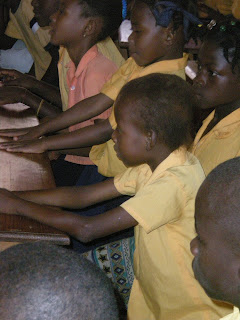
On Wednesday we traveled to a hard-to-reach place (I wanted to see first-hand the challenges we would face in providing care to these villages as well as the challenges they face day-in-and-day-out). This was a brutal walk.

Desye is a small village where probably a couple hundred families live. Interestingly, their homes are more spread out compared with the more centralized appearances of many other villages.
First, the setting is breathtaking. Tall, steep hills surround the area. It makes a wonderful place to live except there is no good way to reach it. The foot paths are challenging and exhausting. The way from the nearest village includes a field of boulders that at some points blockade any motorized vehicle (including a motorcycle). The villagers are determined to make a road, however. They send out brigades every Friday to smash the big rocks into smaller rocks, but even still, I simply don't see how a vehicle could traverse this landscape.
CLICK HERE For a video: The Road to DesyeThe meeting in Desye was well-attended with about 75 present. It was the first, however, to unenthusiastically endorse our commitment to education. One of the teachers spoke up and said that while he teaches a class of about 30 kids, only 2 families had paid the $80 Haitian (or $11 US) per year. Sensing a lack of commitment to education I asked a question of the group that I had also asked of other villages: "How important is education to your community?" The obvious response simply did not come.
I was taken aback. I glanced as Sister Fidelis seated to my right, and she raised an eyebrow, then shook her head. Building a school or providing educational opportunities was not to be on the top of our list for Desye.
Before I could switch subjects, however, they did. Their overriding priority is a road. Much depends on a road. They cannot sell at markets, cannot send their kids to Junior High or High School down by the ocean, cannot access any healthcare...all because of a road. This was their contention, and I believe they are right.
They are invested in their families and their families live in Desye. They cannot move to a better location because 1) they don't believe they should. This is their home. This is where their local loyalty and history lives. They have good, productive land. They can survive here--they cannot thrive, however. 2) They cannot afford to move. In Desye (as in all of Pestel) they own plots of land. Do they abandon the property? Heaven knows they cannot sell it (who would want to buy it?). If they moved closer to the ocean they would have to rent land and a house, which is entirely out of their financial reach. I can see why they do not move to a 'better location.' Whether from a pragmatic-economic standpoint or a socio-historic perspective, there is little compelling reason to move.
They do need some basic infrastructure to be in place before they can hop on the first rung of the economic ladder. These are the rungs that provide opportunity (for education, training, health care, arts, sciences, electricity, etc).
There is no one-size-fits-all approach to Pestel.




















